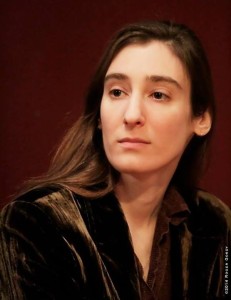Today’s interview features Sonya Taaffe, who contributed to the Body issue with her poem “A Bulgakov Headache“. This is Sonya’s seventh appearance in the magazine; her poems “Persephone in Hel” and “A Clock House” were also reprinted in Here, We Cross: A Collection of Queer and Genderfluid Poetry from Stone Telling.
Sonya Taaffe’s short stories and poems have appeared in such venues as Beyond Binary: Genderqueer and Sexually Fluid Speculative Fiction, The Moment of Change: An Anthology of Feminist Speculative Poetry, Here, We Cross: A Collection of Queer and Genderfluid Poetry from Stone Telling, People of the Book: A Decade of Jewish Science Fiction & Fantasy, The Year’s Best Fantasy and Horror, The Alchemy of Stars: Rhysling Award Winners Showcase, and The Best of Not One of Us. Collected work can be found in Postcards from the Province of Hyphens and Singing Innocence and Experience (Prime Books) and A Mayse-Bikhl (Papaveria Press). She is currently senior poetry editor at Strange Horizons; she holds master’s degrees in Classics from Brandeis and Yale and once named a Kuiper belt object.
No wonder if his books racked him like fevers,
clanged in his dreams like the guns at Kiev.
– from A Bulgakov Headache
ST: What inspired this particular poem? What would you like readers to know about your context, and how it relates to your poem?
I get migraines. Not regularly, unless I’m incautious enough to spend a lot of time around caffeine (I would have said “consuming,” but the process of making coffee syrup in December taught me that all I need is prolonged exposure to the fumes; I shall never work a coffeehouse job), but they are not an uncommon feature of my physical landscape, which already contains several outcroppings of ailments and a bedrock of chronic pain. I had one the night I started “A Bulgakov Headache.” Unlike most of my poems, it began as a title: I believed I had once heard Rose Lemberg refer to migraines as “Bulgakov headaches.” It turned out the technical definition was a headache on one side of the head (like the hemicrania suffered by Pontius Pilate in The Master and Margarita), but by then it was too late. I’d written the first five lines of the poem. After that I was too nauseated and light-sensitive to continue staring at my screen; I finished the poem the next morning while waiting in a doctor’s office and then a church sanctuary, and then had to reconstruct it from memory after my computer crashed. All in all, it’s an appropriate genesis for a poem about a writer who trained as a doctor, wrote of Christ and the Devil, and famously decreed рукописи не горят—manuscripts don’t burn. I could still have done without the migraine.
ST: Is the Body a central theme in your work? If so, what other works of yours deal with it? If not, what called you to it this time?
I write about the disembodied more than I write about the body, I think: the dead and the never-born are a recurring concern. I’ve just finished a cycle of ghost poems ranging from the ancient world to the twenty-first century, encompassing both the historical and the imagined dead. Much of my life in the last few years has been slowly disentangling myself from the hollow sensation of haunting my own life, a hungry ghost clinging where it should have given up long ago. Reminding myself that I have the right to live in my body as well as the obligation was part of that process, but it doesn’t seem to have come out much in my work, except for the way that I found the ghost poems shifting from dead to living voices. The other major body poem I can call to mind right now is also about migraines, now that I think about it (“Aristeia,” at Apex Magazine). I have written poems about sex, but I seem to classify those differently.
ST: What else would you like to tell our readers about your poem?
Read Mikhail Bulgakov! The poems draws details from his life, but I find I don’t want to explain each reference; I want you to read A Country Doctor’s Notebook, Notes on the Cuff, The Master and Margarita, Black Snow, all the ways Bulgakov broke his own life into satirical fragments and reshuffled them for the fevery, nervy protagonists of his shadow-show. They’re jagged stories, all of them, even the beautiful ones. You catch their author in them as if in a trick mirror. Plus there’s the science fiction: rampaging giant ostriches, skirt-chasing dogs. And the letters and diaries. I am writing at night because almost every night my wife and I don’t get to sleep until three or four in the morning. I hear you, Misha.
ST: Do you have any upcoming projects you might like to talk about?
I have poems and short fiction forthcoming in some of the usual suspects (Mythic Delirium, Not One of Us) and some new ones (Interfictions, Lakeside Circus) and I’m looking for a home for the ghost poems. Anything else, I’ll let you know!
ST: Thank you very much, Sonya!
_____
If you enjoyed this poem and the interview, please consider letting the poet know! Also, we now have a Patreon page, and would appreciate your support.

